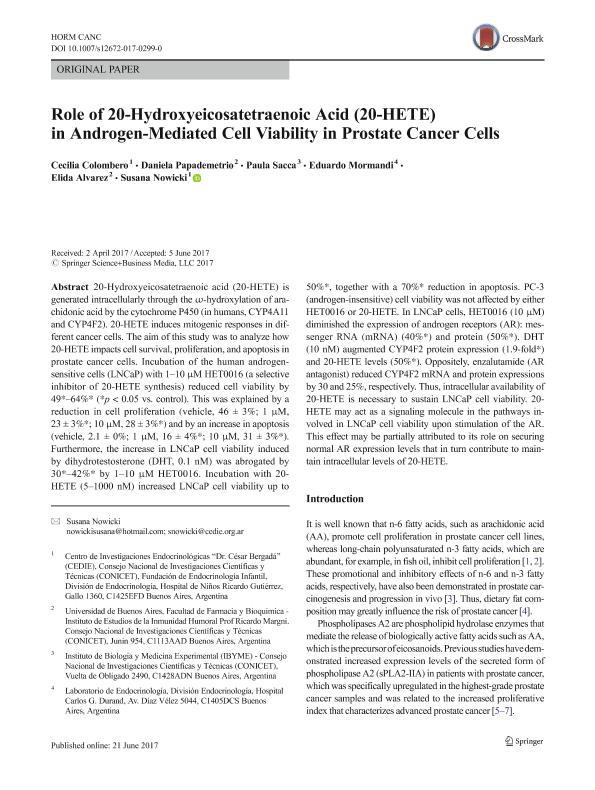Artículo
Role of 20-Hydroxyeicosatetraenoic Acid (20-HETE) in androgen-mediated cell viability in prostate cancer cells
Colombero Rivas, Cecilia Edith ; Papademetrio, Daniela Laura
; Papademetrio, Daniela Laura ; Sacca, Paula Alejandra
; Sacca, Paula Alejandra ; Mormandi, Eduardo; Alvarez Carbonetto, Elida M. del C.
; Mormandi, Eduardo; Alvarez Carbonetto, Elida M. del C. ; Nowicki, Susana
; Nowicki, Susana
 ; Papademetrio, Daniela Laura
; Papademetrio, Daniela Laura ; Sacca, Paula Alejandra
; Sacca, Paula Alejandra ; Mormandi, Eduardo; Alvarez Carbonetto, Elida M. del C.
; Mormandi, Eduardo; Alvarez Carbonetto, Elida M. del C. ; Nowicki, Susana
; Nowicki, Susana
Fecha de publicación:
08/2017
Editorial:
Springer
Revista:
Hormones and cancer
ISSN:
1868-8497
e-ISSN:
1868-8500
Idioma:
Inglés
Tipo de recurso:
Artículo publicado
Clasificación temática:
Resumen
20-Hydroxyeicosatetraenoic acid (20-HETE) is generated intracellularly through the ω-hydroxylation of arachidonic acid by the cytochrome P450 (in humans, CYP4A11 and CYP4F2). 20-HETE induces mitogenic responses in different cancer cells. The aim of this study was to analyze how 20-HETE impacts cell survival, proliferation, and apoptosis in prostate cancer cells. Incubation of the human androgen-sensitive cells (LNCaP) with 1?10 μM HET0016 (a selective inhibitor of 20-HETE synthesis) reduced cell viability by 49*?64%* (*p < 0.05 vs. control). This was explained by a reduction in cell proliferation (vehicle, 46 ± 3%; 1 μM, 23 ± 3%*; 10 μM, 28 ± 3%*) and by an increase in apoptosis (vehicle, 2.1 ± 0%; 1 μM, 16 ± 4%*; 10 μM, 31 ± 3%*). Furthermore, the increase in LNCaP cell viability induced by dihydrotestosterone (DHT, 0.1 nM) was abrogated by 30*?42%* by 1?10 μM HET0016. Incubation with 20-HETE (5?1000 nM) increased LNCaP cell viability up to 50%*, together with a 70%* reduction in apoptosis. PC-3 (androgen-insensitive) cell viability was not affected by either HET0016 or 20-HETE. In LNCaP cells, HET0016 (10 μM) diminished the expression of androgen receptors (AR): messenger RNA (mRNA) (40%*) and protein (50%*). DHT (10 nM) augmented CYP4F2 protein expression (1.9-fold*) and 20-HETE levels (50%*). Oppositely, enzalutamide (AR antagonist) reduced CYP4F2 mRNA and protein expressions by 30 and 25%, respectively. Thus, intracellular availability of 20-HETE is necessary to sustain LNCaP cell viability. 20-HETE may act as a signaling molecule in the pathways involved in LNCaP cell viability upon stimulation of the AR. This effect may be partially attributed to its role on securing normal AR expression levels that in turn contribute to maintain intracellular levels of 20-HETE.
Archivos asociados
Licencia
Identificadores
Colecciones
Articulos(CEDIE)
Articulos de CENTRO DE INVESTIGACIONES ENDOCRINOLOGICAS "DR. CESAR BERGADA"
Articulos de CENTRO DE INVESTIGACIONES ENDOCRINOLOGICAS "DR. CESAR BERGADA"
Articulos(IBYME)
Articulos de INST.DE BIOLOGIA Y MEDICINA EXPERIMENTAL (I)
Articulos de INST.DE BIOLOGIA Y MEDICINA EXPERIMENTAL (I)
Citación
Colombero Rivas, Cecilia Edith; Papademetrio, Daniela Laura; Sacca, Paula Alejandra; Mormandi, Eduardo; Alvarez Carbonetto, Elida M. del C.; et al.; Role of 20-Hydroxyeicosatetraenoic Acid (20-HETE) in androgen-mediated cell viability in prostate cancer cells; Springer; Hormones and cancer; 8; 4; 8-2017; 243-256
Compartir
Altmétricas



